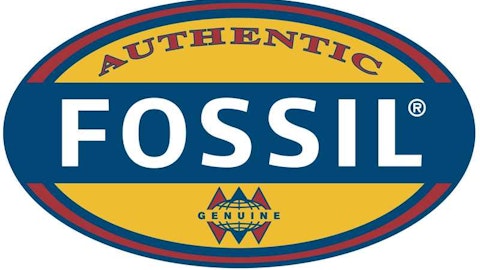
Three reasons.
Ralph Lauren is average — at best
If you haven’t taken a look at it in a while, you might be surprised to learn that Ralph Lauren’s stock price is actually in the triple digits. This might lead you to think things are going well for the company — but they aren’t.
When you stack Ralph Lauren Corp (NYSE:RL) stock up against two of its bigger rivals, the ambiguously named PVH Corp (NYSE:PVH) and VF Corp (NYSE:VFC), it turns out that Ralph is actually the only stock of the three that’s been underperforming the S&P 500 over the past year. As the S&P gained 20%, Ralph Lauren stock tacked on only 15% — barely half the 29% gain at V.F., and only a third of PVH Corp (NYSE:PVH)’s 46% return.
True, Ralph Lauren Corp (NYSE:RL) stock also pays a dividend, but at a mere 0.9%, it’s hardly enough to make up the difference in stock price gains — and, in any case, Ralph’s dividend yield is less than half the payout at VF Corp (NYSE:VFC).
Why is Ralph so stingy with its cash? Perhaps because, of the three companies named, it’s got the least cash to play with. Lay the three firms side by side, and you’ll quickly see that Ralph has the worst “free cash flow yield” of the bunch.

RL Free Cash Flow Yield data by YCharts
Ralph Lauren costs too much
Yet, it’s surprising that, for a company that’s producing less cash per dollar of market cap than either of its Big Apparel peers, Ralph Lauren stock actually costs more relative to its profits than do either of its rivals. Priced at 24 times earnings, Ralph Lauren Corp (NYSE:RL) shares carry a valuation 19% higher than shares of PVH Corp (NYSE:PVH), and cost 36% more than V.F. Corporation.
But does Ralph Lauren Corp (NYSE:RL) stock deserve this premium valuation?

It hardly looks like it does. While Ralph Lauren Corp (NYSE:RL)’s 9.8% sales growth rate over the past five years is certainly respectable enough, it’s not all that much better than the 8.6% sales growth rate that V.F. Corporation threw up — and it’s less than half the growth rate of PVH.
Ralph Lauren stock is going nowhere
Granted, there’s still the old investing truism that investing isn’t about what a stock has done in the past, but what it might do in the future. In that regard, there may be some validity to investors paying higher P/E and P/FCF ratios for Ralph Lauren stock than they shell out for shares of PVH or VF Corp (NYSE:VFC). After all, analysts do expect to see Ralph grow its profits a bit faster than the competition over the next five years:

Yet, even after looking at this last chart, a couple questions spring to mind. For example, what’s the basis for analysts thinking that Ralph Lauren will produce faster earnings growth than — for example — PVH produces? After all, PVH is the company growing sales faster. That would seem to indicate that PVH’s products are the more popular, and that PVH — not Ralph Lauren — is the company more likely to marry high profit margins with high sales growth to produce pricing power … and strong earnings growth.
Even if the analysts are right, and even if Ralph Lauren Corp (NYSE:RL) does grow as it’s predicted to, does it really make sense to pay 24 times earnings, and 31 times free cash flow, to own a share of Ralph Lauren stock? Does it make sense to do this when even in the best case, Ralph will only produce respectable, but hardly extraordinary, low-to-mid-teens profit growth?
I don’t think it does make sense. Overpriced and underperforming, I think Ralph Lauren stock is likely to keep on going nowhere.
The article Ralph Lauren Stock Is Going Nowhere — Here’s Why originally appeared on Fool.com and is written by Rich Smith.
Fool contributor Rich Smith has no position in any stocks mentioned. The Motley Fool has no position in any of the stocks mentioned.
Copyright © 1995 – 2013 The Motley Fool, LLC. All rights reserved. The Motley Fool has a disclosure policy.

